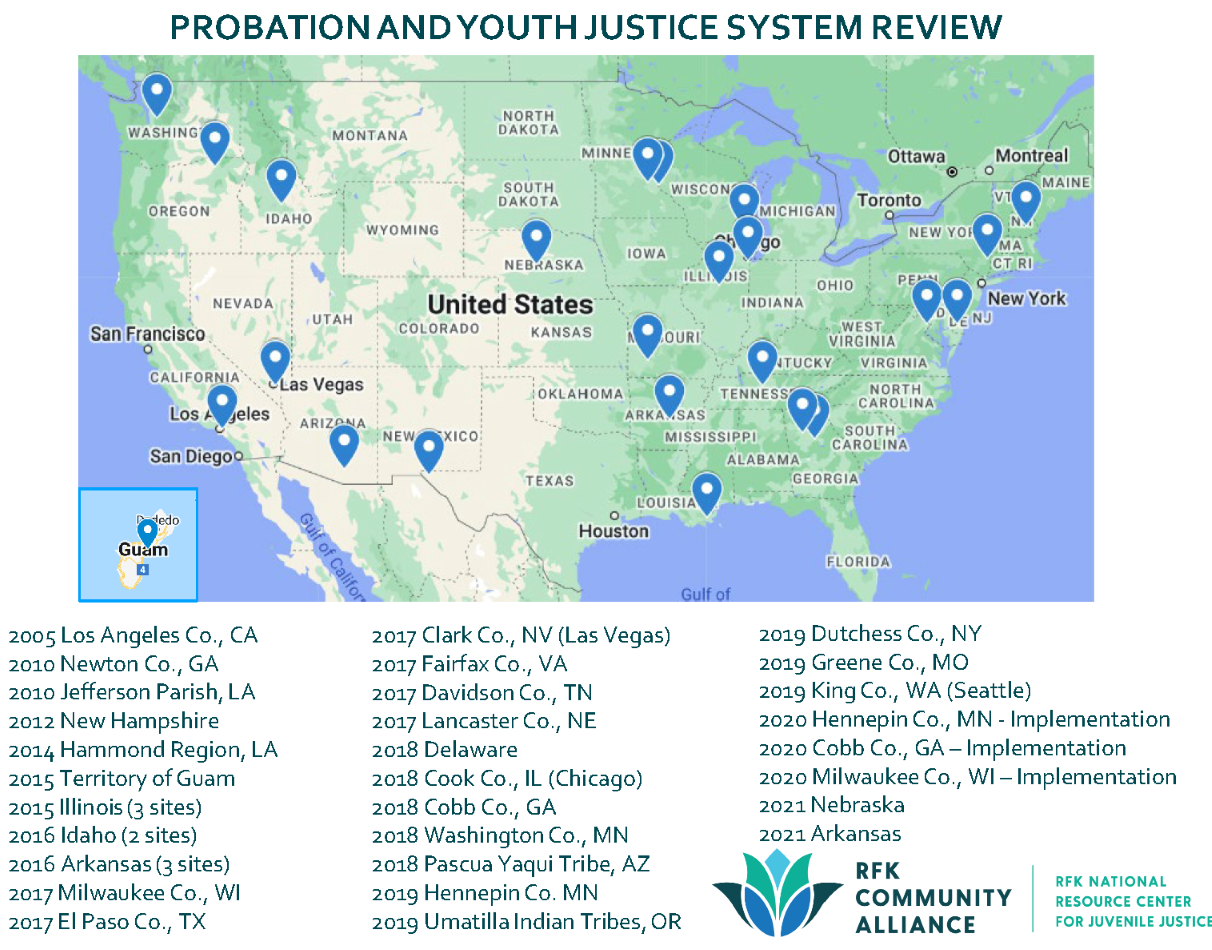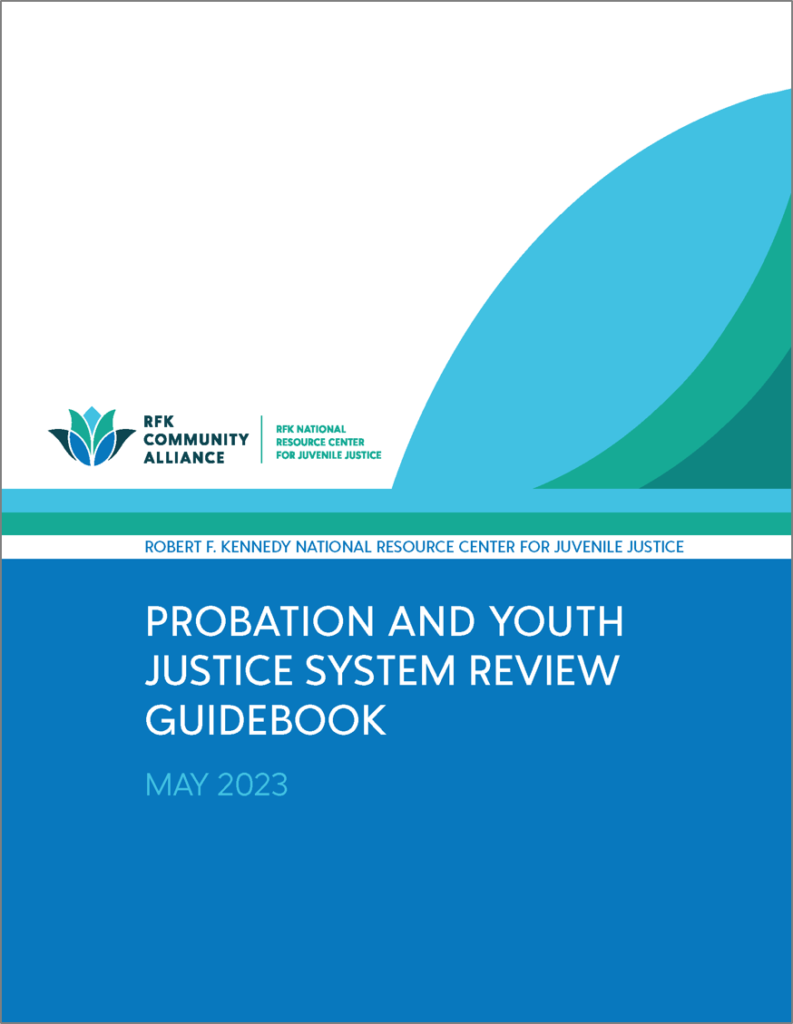[VIDEO] Engaging in Impactful and Positive Probation and Youth Justice System Improvement Presented by the RFK National Resource Center
This new, brief video captures the methods and process through which your jurisdiction can undertake critical steps that produce significant improvements of the performance of your youth justice system. Featuring RFK National Resource’s Executive Director, John A. Tuell, and Deputy Executive Director, Jodi Martin, the video reflects the work that courageous youth justice leaders across the country have undertaken to produce important and necessary advances in their youth justice system using the Probation and Youth Justice System Review. The video also highlights the opportunity to analyze and reform probation and court staff policies and practices that ultimately produce outcomes for youth, families, and communities.
For over a decade, the Robert F. Kennedy National Resource Center for Juvenile Justice has used a proven framework for review and analysis to partner with more than 30 state and local jurisdictions to enhance probation department and youth justice system performance. This support has resulted in the development of several publications, tools, and resources that provide guidance to jurisdictions undertaking such an assessment process. Most importantly, the efforts have produced positive, replicable, measurable, and sustainable enhancements in system performance and youth outcomes. This work has demonstrated the imperative and capacity of state and local jurisdictions to achieve shared and compatible goals of youth accountability, reduction of recidivism, and future risk of delinquent behavior, desirable behavior changes for youth in multiple domains, and improved community safety.
Probation departments and youth justice systems, like a number of other longstanding agencies, function within a framework of statutes, policies, and practices that were established over the course of many years. Typically, there has been little time or effort to reflect on that framework to determine how well it is working and whether it functions in a manner that results in the achievement of desired youth outcomes and effective system performance. Further, a culture of doing things “the way we’ve always done them” often permeates daily operations and often undermines changes that incorporate evidence-based practices and the shift to using effective programs and services that positively impact youth outcomes and system performance.
In support of our technical assistance and consultation-based partnerships, our primary guiding publications include:
Probation and Youth Justice System Review Guidebook
Prepared by John A. Tuell, and with support from Jodi Martin and Sorrel Lewis (Robert F. Kennedy National Resource Center for Juvenile Justice, 2023)
Keys to Youth Justice Improvement: Demonstration of Practical, Sustainable, Measurable, and Replicable Solutions
John Tuell, with Michelle Darling and Jodi Martin (Robert F. Kennedy National Resource Center for Juvenile Justice, 2023)
Diversion and Alternatives Reform Team Guidebook
Robert F. Kennedy National Resource Center for Juvenile Justice, 2023
Developmental Reform in Juvenile Justice: Translating the Science of Adolescent Development to Sustainable Best Practice
John A. Tuell, with Jessica Heldman and Kari Harp (Robert F. Kennedy National Resource Center for Juvenile Justice, 2017)
The RFK National Resource Center was privileged to manage the Dennis M. Mondoro Probation and Juvenile Justice System Enhancement Project through a grant from the Office of Juvenile Justice and Delinquency Prevention (FY 18 Second Chance Act Ensuring Public Safety and Improving Outcomes for Youth in Confinement and While Under Community Supervision, Award #2018-CZ-BX-K002). This project closed at the end of 2022 and we published the results and achievements from that project in our Innovation Brief, Keys to Youth Justice Improvement: Demonstration of Practical, Sustainable, Measurable, and Replicable Solutions. Our publication resources and expert consultants supported planning, implementation, sustainability and measurement in six competitively selected jurisdictions:
- Clark County (Las Vegas), Nevada
- Fairfax County (Washington, DC suburban area), Virginia
- Lancaster County (Lincoln), Nebraska
- Dutchess County, New York
- Greene County (Springfield), Missouri
- King County (Seattle), Washington
Our approach ensures that each jurisdiction is able to identify the most critical issues that confront their department, court, and youth justice system and is guided through steps to create a carefully tailored work plan to address them. The core elements of such a plan include administrative analysis of program goals, objectives and implementation; probation management, supervision, assignment, monitoring and behavior change practices; intra- and interagency work processes; and quality assurance for system performance and client outcomes. The Probation and Youth Justice System Review is an exciting opportunity for the principals and partners involved in the management, day-to-day operations and functions of a probation department to assess how they are doing in relation to their goals and objectives and to devise practical strategies for improved performance and youth outcomes. The process also supports the development of change management and implementation strategies to support effective application of system improvements (policy, practice, and procedures) and new programs and probation and community supervision approaches. In short, strengths and assets are built upon and positive changes are accomplished.
On-Site Probation System Review Training
The RFK National Resource Center has developed a Probation and Youth Justice System Review Training which provides an opportunity for the leaders of your state or local system to learn about the key areas of probation and youth justice system practice and policy that must be examined and aligned with national best practices in order to achieve optimal youth and system outcomes. The training (flexible in length and format to ensure the curriculum is matched to the needs of the jurisdiction), is provided in your jurisdiction to maximize stakeholder participation and emphasizes the participation of multi-system stakeholders (e.g., judges, prosecutors, public defenders, law enforcement, service and treatment providers).

Additional Resources
Recommended Publications & Articles
A Proactive Approach to Self-Assessment in the Juvenile Justice System
Honorable Mark A. Ingram & Kari Harp (National Trends in State Court, National Center for State Courts, 2016)
Letting Go of What Doesn’t Work for Juvenile Probation, Embracing What Does
John A. Tuell and Kari L. Harp (Juvenile Justice Information Exchange, June 2016)
Probation Review Implementation: How Best Practices Meet Everyday Practices
Dr. John S. Ryals, Jr. (Robert F. Kennedy Children’s Action Corps, 2013)
Sustaining the Momentum of Probation System Reform in Jefferson Parish
Dr. John S. Ryals, Jr. (Robert F. Kennedy National Resource Center for Juvenile Justice, 2015)
Other Tools & Guidance
- Risk Screening Tool & Risk-Needs Assessment Implementation Checklists (click here to view)
- Data Planning Exercise – Introduction (click here to view)
- Data Planning – WorkGrid (Probation Only) (click here to view)
- Data Planning – WorkGrid (Probation/Reentry Continuum) (click here to view)
- Process Mapping Exercise – Introduction (click here to view)
- Employee Survey Exercise – Introduction (click here to view)
- Management, Resource, and Training Exercise – Introduction (click here to view)
- Management Practices Meeting – Communications Grid (click here to view)
- Inventory of Programs and Services Exercise – WorkGrid (click here to view)
- Professional Training Inventory – WorkGrid (click here to view)

